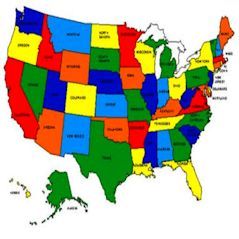
|
Some Common Myths Thought to be True - Myth 151
Myth 151: The United States of America Numbers Fifty States
Technically, no. There are only forty-six states in the United States -
Kentucky, Massachusetts, Pennsylvania, and Virginia are commonwealths.
Before you even begin to discuss the concepts and differences between these
designations, you have to first determine where you are located. So, where are
you talking about? Commonwealths and States, in domestic law, are pretty much
treated the same. So much so that one could say there is no practical
difference. As a basic rule, in the United States of America, commonwealths and
states are treated the same under the U. S. Constitution.
Like the other comments following, it depends on what kind of commonwealth
you're talking about; some consider Puerto Rico a commonwealth (which has some
benefits of federal assistance, but restricted voting rights, etc).
|
|
However, if
you're asking about Virginia, Kentucky, Massachusetts, or Pennsylvania (the
four "states" in the US that call themselves a commonwealth), in a commonwealth
landowners do not possess mineral or oil rights to their land. They don't
actually own their land but own its use. However this does not significantly
differentiate their structure or self-government in any way from other states
in the Union.
Studying the constitutions of most states you will find similar wording
regarding the states identity or "sovereignty." To the federal government all
states are created equal. The differences come about through actions of the
states (or in VA, MA, PA and KY the commonwealth). Relative to the US there is
NO difference between a state and a commonwealth although there are certainly
differences in how each state is governed.
|
